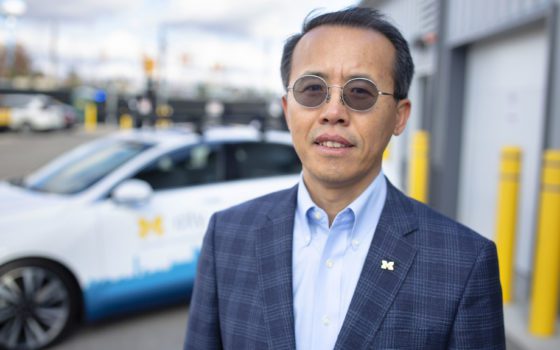Henry Liu
Mcity Director
Director, Center for Connected and Automated Transportation
Professor of Civil and Environmental Engineering
Henry Liu is director of Mcity, the University of Michigan’s public-private research partnership devoted to transforming mobility. He is also a professor in the Department of Civil and Environmental Engineering at U-M, a research professor at the U-M Transportation Research Institute, and director of the U.S. Department of Transportation’s Region 5 Center for Connected and Automated Transportation. In addition, Liu founded U-M’s Next Generation Transportation Systems program. In September 2023, Liu was appointed the Bruce D. Greenshields Collegiate Professor of Engineering.
From August 2017 to August 2019, Liu took a leave of absence from U-M and served as DiDi Fellow and Chief Scientist on Smart Transportation for DiDi Chuxing in China, one of the leading mobility service providers in the world. While he was with DiDi, Liu established and led the Urban Transportation Business Unit.
Prior to joining U-M, Liu was an associate professor of civil engineering at the University of Minnesota, Twin Cities. He received his Ph.D. degree in Civil and Environmental Engineering from the University of Wisconsin at Madison in 2000 and his bachelor’s degree in Automotive Engineering from Tsinghua University in China in 1993.
Liu conducts interdisciplinary research at the interface of transportation engineering, automotive engineering, and artificial intelligence. He is recognized for his foundational work in cyber-physical transportation systems, particularly on the development of smart traffic signal systems with connected vehicles, and testing/evaluation of autonomous vehicles. His work on safety validation of autonomous vehicles has been published in Nature and featured as the cover story. Liu is the managing editor of Journal of Intelligent Transportation Systems and a board member for the ITS America and IEEE ITS Society.
Liu and his research team pioneered development of the world’s first connected vehicle-based traffic signal optimization system, OSaaS (Optimizing Signals as a Service), which has been implemented in more than 20 cities in China with 2300 signalized intersections. Liu and his team also developed a patent-pending augmented reality system for testing autonomous vehicles.
